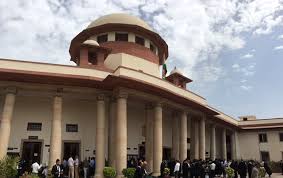The present appeal is at the behest of the brother-in-law of the detenue, who is challenging the validity of the detention order and aggrieved at the refusal of the High Court of Calcutta to set aside the order of detention passed by the respondents. (Para 2)
On receiving information pertaining to a consignment containing gold and foreign currencies, escaping the watchful eyes of the customs department, four persons were apprehended. On eliciting further information from them, a search was conducted yielding huge quantity of gold, along with the recovery of foreign currencies of various denominations. As a consequence, the detenue was arrested, followed by a detention order passed by the detaining authority in exercise of the powers conferred under Section 3 of the Conservation of Foreign Exchange and Prevention of Smuggling Activities Act, 1974 (hereinafter referred to as “COFEPOSA Act”). (Para 3)
Two more attempts were made by the respondents to serve the documents along with the grounds of detention. After refusing to receive the same on the second occasion i.e., on 03.10.2023 it was finally received by him on 10.10.2023. Interestingly, the detenue, through the appellant, filed the Writ Petition on 03.10.2023 inter alia contending that the respondents have not served the grounds of detention. The Division Bench of the High Court of Calcutta dismissed the Writ Petition inter alia holding that it was the detenue himself who had refused to receive the grounds of detention, a fact clearly indicated and proved through the panchnama. (Para 5)
On facts, we find that the detenue is not entitled to any relief as he has not only suppressed the facts as proved in his refusal to receive the grounds of detention, apart from reading them in detail, but has also approached the Court with unclean hands. It seems to us that it is a deliberate ploy adopted by the detenue to secure favourable orders from the Court. A perusal of the panchnama clearly indicates the adequacy of his knowledge in English, as he has not only signed the document in English but also made his objection with respect to receipt of the grounds of detention. We find no error in the procedure adopted by the respondents as due compliance was made to translate all documents in Bengali apart from persuading the detenue to receive them. In addition, the panchnama was signed by the independent witnesses. The detenue also read the grounds of detention and the relevant documents. Therefore, he was well aware of his right to make a representation. (Para 16)
As discussed, the grounds of detention forming the basis of the satisfaction of the detaining authority, were made known to the detenue. He cannot seek all the facts, including access to the telephonic conversation relied on, especially when he did not exercise his right to make the representation. It is pertinent to mention that we are only dealing with the validity of the detention order and not a regular criminal case against the accused. (Para 17)
The other grounds raised also do not merit any acceptance, in the light of our earlier discussion. We also find that the grounds of detention were attempted to be served on the detenue at the earliest point of time – i.e. on the very next day after his detention. (Para 18)
For the foregoing reasons, we find no ground to interfere with the impugned order passed by the High Court of Calcutta. The appeal stands dismissed. Pending application(s), if any, stand(s) disposed of. (Para 19)
SUPREME COURT OF INDIA
2024 STPL(Web) 18 SC
[2024 INSC 18]
Sarfaraz Alam Vs. Union Of India & Ors
Criminal Appeal No. 45 of 2024 [Arising out of SLP (Crl.) No. 13193 of 2023] –Decided on 04-01-2024.
https://stpllaw.in/wp-content/uploads/2024/01/2024-STPLWeb-18-SC.pdf







